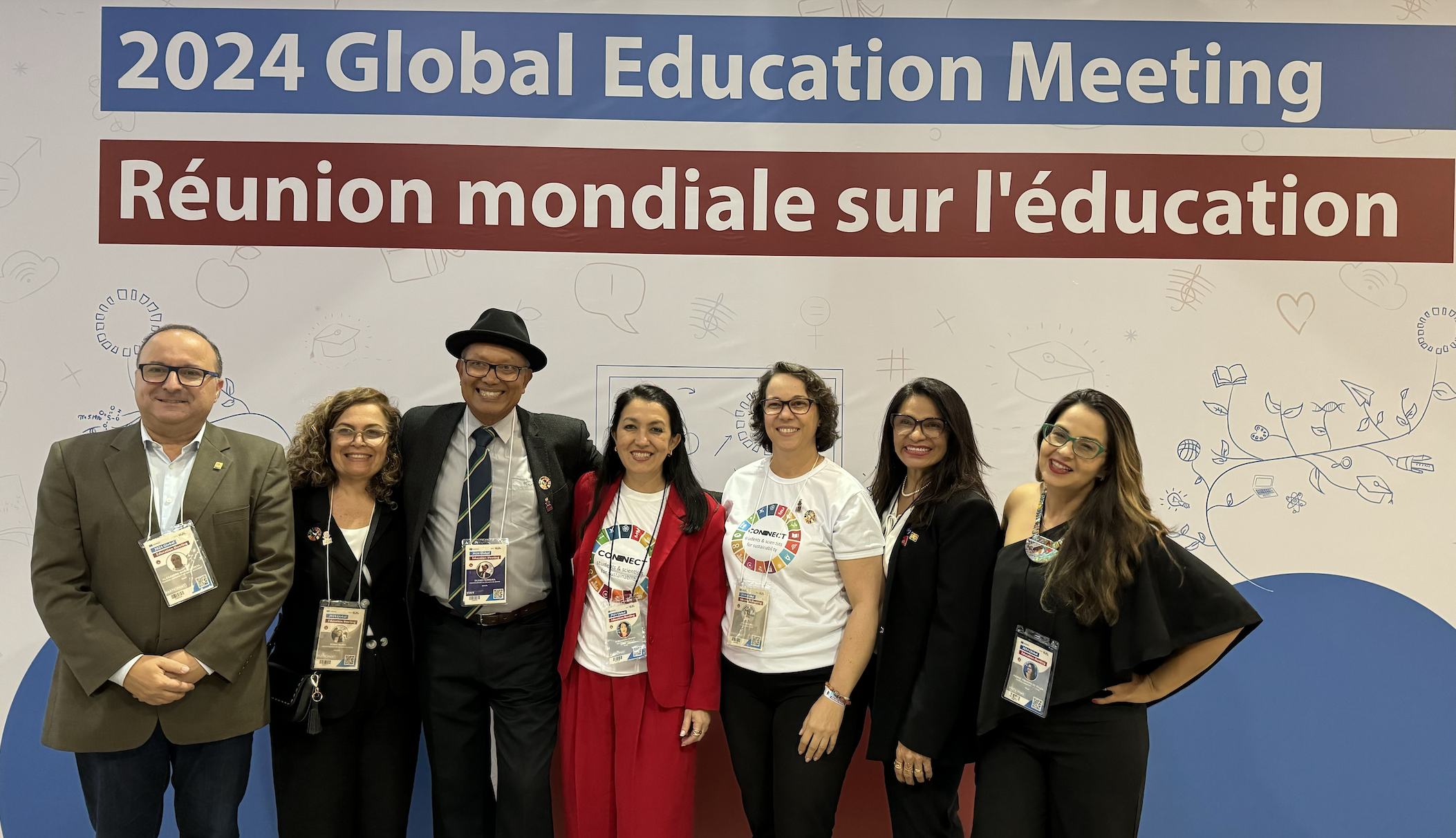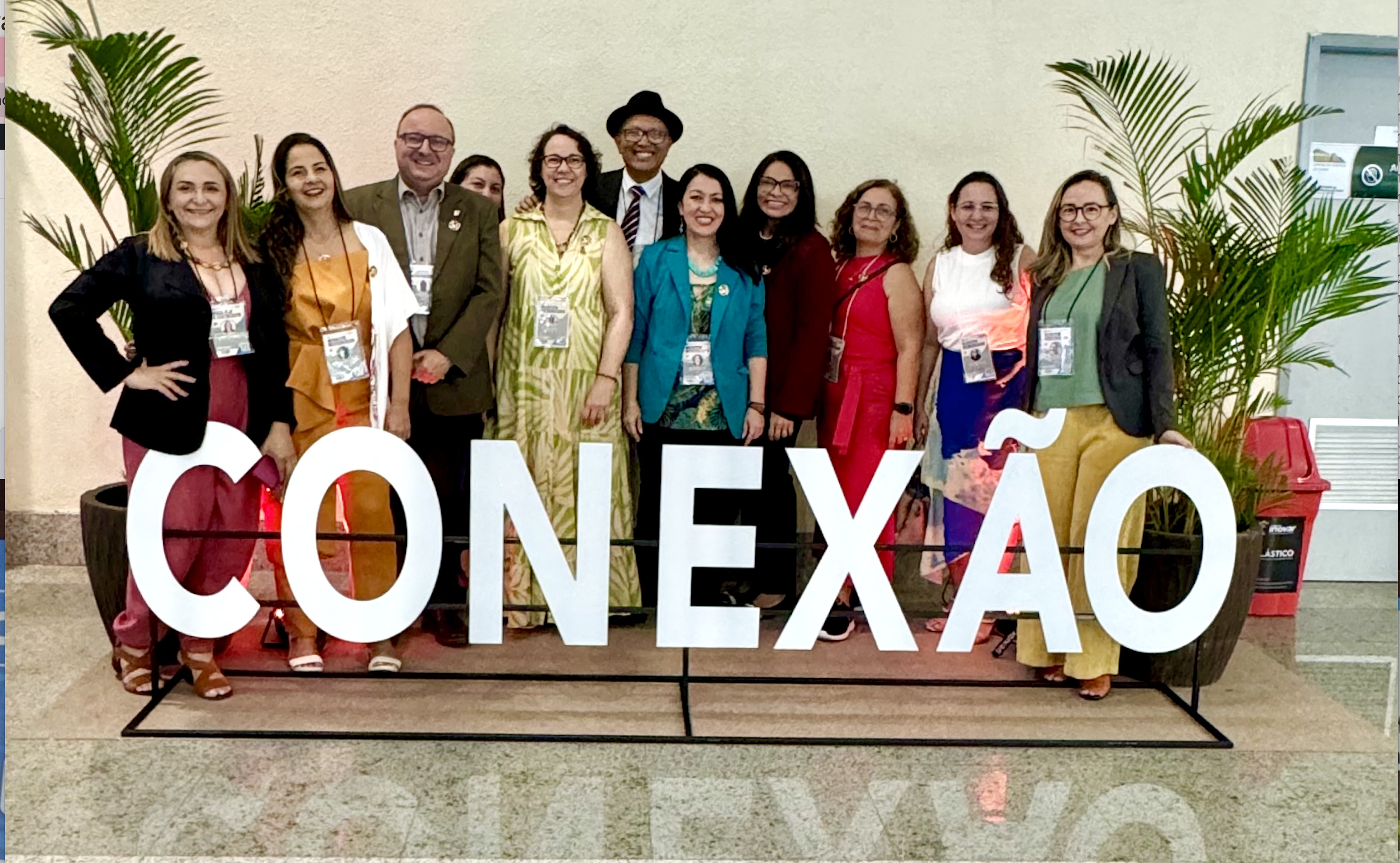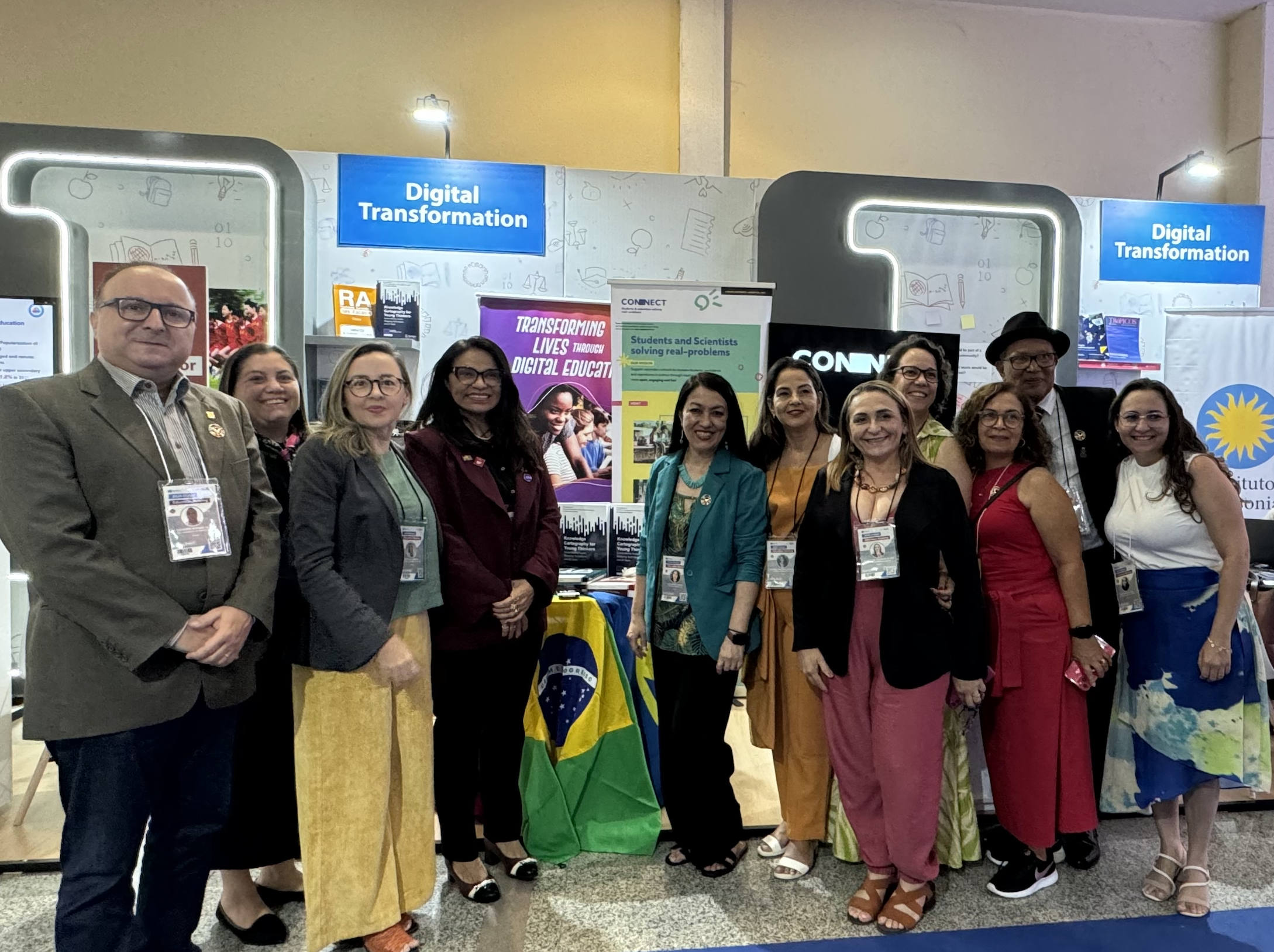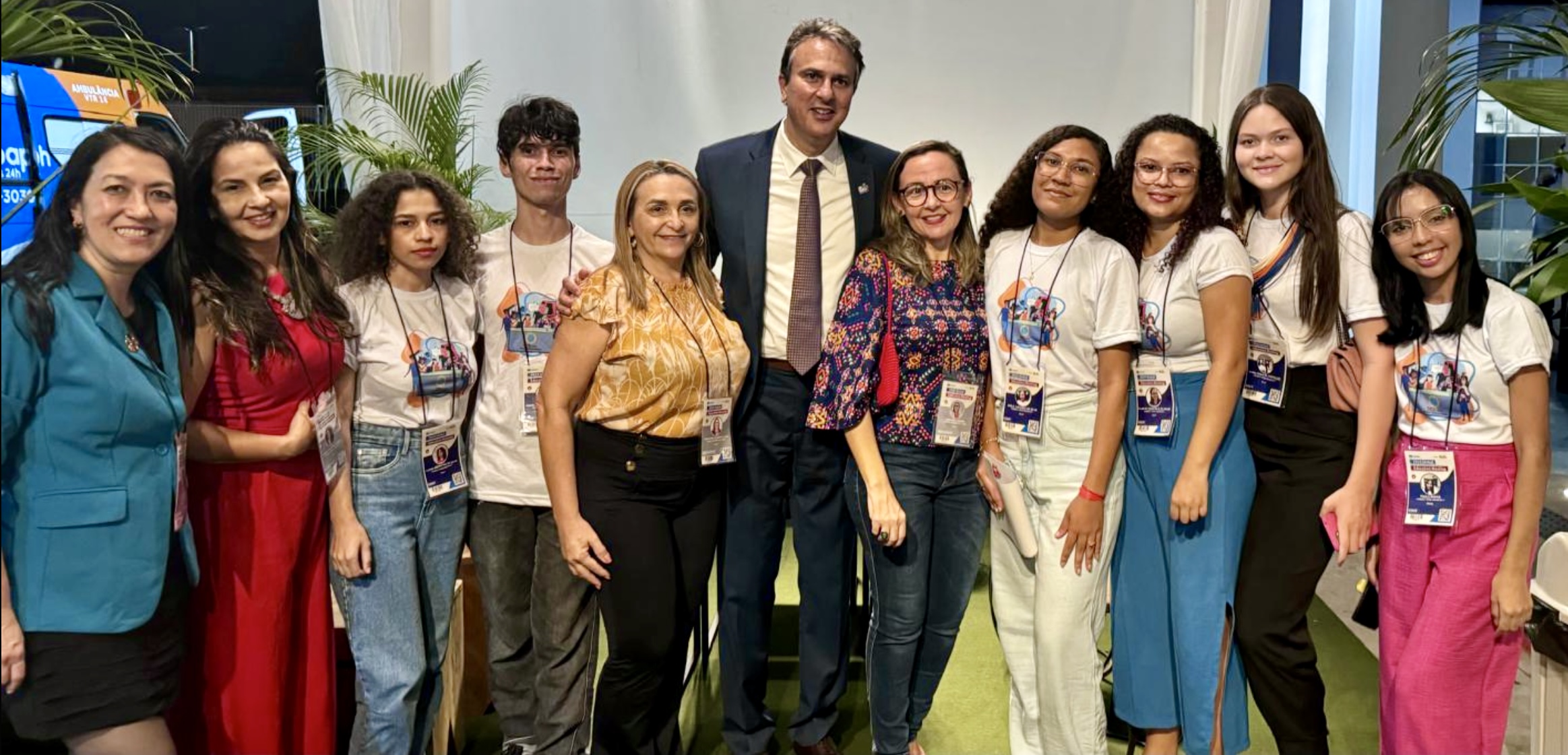News . Events UNESCO: Global Education Meeting

On October 31 and November 1, 2024, Dr. Okada from The Open University UK and representatives from Brazil’s CONNECT 2030 participated in UNESCO’s Global Education Meeting (GEM) in Fortaleza. This high-level event brought together ministers of education, government representatives, and international organizations, with attendees from 194 UNESCO member countries. The GEM served as a crucial forum for discussing inclusive and equitable education policies, reflecting UNESCO’s mission for sustainable development and aligning with Brazil’s G20 presidency focus on equity and inclusion.
Photo: CONNECT2030 – Recognized by UNESCO as one of the top 3 initiatives for Global Education and Digital Transformation
Relevance for Open Schooling
The GEM underscored the role of education as a social equalizer and catalyst for sustainable development, resonating strongly with the goals of Open Schooling. Open Schooling connects students to real-world challenges by linking curriculum with SDG-driven projects that engage communities and experts. The emphasis on multilateral dialogue at GEM highlights the value of collaborative, community-centered learning approaches—an essential feature of Open Schooling that empowers students to address pressing social and environmental issues.
CONNECT 2030: A Model for Digital Transformation in Open Schooling
Recognized by UNESCO as one of the top 3 global initiatives on Global Education for digital transformation, CONNECT 2030, led by Dr. Okada, exemplifies the Open Schooling approach. This network, which includes diverse organizations such as Anjos Digitais, Ceará’s Department of Education (SEDUC), and universities (UFSC, UFCA, UNEB), demonstrated Open Schooling in action at GEM. CONNECT 2030 initiatives empower youth by integrating real-world problem-solving with digital skills, fostering SDG-focused learning experiences that extend beyond the classroom.
Key Open Schooling Initiatives Presented by CONNECT 2030

Photo3: Partners of CONNECT2030 from Federal University of Santa Catarina (Brazil South); Federal University of Cariri; University of Bahia State; Brazil Government IBICT; Anjos Digitais and The Open University.
At GEM, CONNECT 2030 showcased five Open Schooling projects, each aligning with sustainable development goals and providing concrete pathways for students to engage with and impact their communities:
- AI for Ecosystem Protection and Support for Vulnerable Communities Affected by Climate Change
Led by The OU and supported by local education authorities, this initiative enables students to learn through environmental stewardship. Youth collaborate with communities, researchers, and AI technologies to protect rainforests, wetlands, and fire-affected areas, addressing real-life challenges that include Afro-Indigenous and other vulnerable communities. - Audiovisual Resources for Heritage and Cultural Protection and Resilience
Spearheaded by UFCA with support from The OU, this project empowers students to use digital media to preserve cultural heritage and enhance urban sustainability. By engaging local communities in Brazil’s semi-arid regions, youth learn to connect with and support their heritage through educational outreach and creative expression. - Augmented Reality (AR) for Health and Well-being
This UFSC-led initiative, supported by The OU and Brazil’s Ministry of Science, Technology, and Innovation, brings AR technology into health education, helping students, families, and professionals deepen their understanding of health and well-being. It creates an interactive Open Schooling experience, making complex health topics accessible and engaging. - Digital Inclusion for Gender Equality and Equity
Led by Anjos Digitais and supported by The OU, this project promotes digital skills among women in Brazil’s North and Northeast regions. It fosters gender equity by empowering young women to participate in the digital economy, reflecting Open Schooling’s commitment to inclusive and community-driven education. - Mobile Tools for Decent Work Against Human Trafficking
UNEB leads this initiative with The OU’s support, providing youth with mobile tools and educational resources to raise awareness and prevent human trafficking. By combining education with professional support, it exemplifies Open Schooling’s mission of addressing real-world social issues while equipping students with practical, impactful skills.
Photo3: Brazilian Ministry of Education Camilo Santana with Teachers and Students of CONNECT2030. Dr. Karine Pinheiro (Federal University of Cariri) and Dr. Alexandra Okada (The Open University).
Conclusion
The Global Education Meeting highlighted the critical role of Open Schooling in fostering a sustainable, inclusive future. Through CONNECT 2030, students are equipped to tackle real-life challenges, directly engaging with their communities and learning from experts, all while contributing to the SDGs. As demonstrated at GEM, Open Schooling empowers young people as active agents of change, bridging the gap between education and community action to create lasting, meaningful impact.
GEM 2024 in numbers
· Ministers and Vice Ministers from across the globe
· country delegations
· participants
· plenaries and
parallel sessions
· exhibitors in the booth exhibit
· And best of all, the Fortaleza Declaration was adopted!
The Fortaleza Declaration
· The Fortaleza Declaration, an ambitious, action-oriented outcome document of the 2024 GEM, was adopted during the closing session, is now available in Arabic, Chinese, English, French, Russian and Spanish.
· The Declaration is a product of 10 intensive discussions and consultations with all regions and constituency groups. Consultation reports are available here.
· More about the Declaration: Fortaleza Declaration: A bold step towards inclusive education at the 2024 Global Education Meeting
Revisit the meeting
· Replay video recordings of all plenary sessions are available in English here: Day 1, Day 2.
· Photos of speakers and panels are available here.
· Takeaways from the 19 parallel sessions are available here.
Reports launched at the 2024 GEM
· 2024/5 Global Education Monitoring Report on Leadership and Education
· The Future at Risk: Why Investing in Education is Critical
· 2024 Education Finance Watch
Communications
· Press release: 251M children and youth still out of school, despite decades of progress (UNESCO report) | UNESCO
· Press conference replay.

